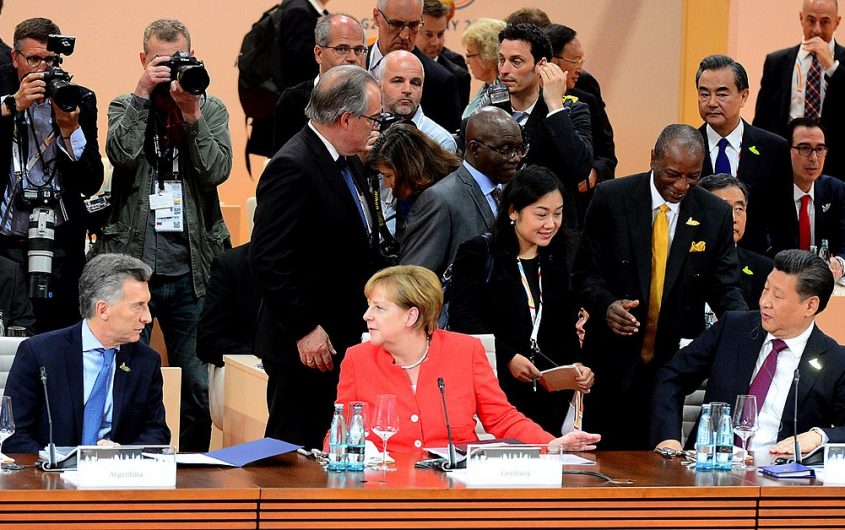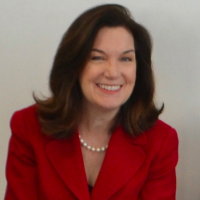
Casa Rosada via Wikimedia Commons
AGI Asks: What is Angela Merkel’s Legacy on Engagement with China?

Andrew Small
The German Marshall Fund of the United States
Andrew Small is a senior transatlantic fellow with GMF's Asia Program, which he established in 2006. His research focuses on U.S.–China relations, Europe–China relations, Chinese policy in South Asia, and broader developments in China's foreign and economic policy. He was based in GMF’s Brussels office for five years, and worked before that as the director of the Foreign Policy Centre's Beijing office, as a visiting fellow at the Chinese Academy of Social Sciences, and an ESU scholar in the office of Senator Edward M. Kennedy. His articles and papers have been published in The New York Times, Foreign Affairs, Foreign Policy, the Washington Quarterly, as well as many other journals, magazines, and newspapers. He is the author of the book The China-Pakistan Axis: Asia's New Geopolitics published with Hurst / Oxford University Press in 2015. Small was educated at Balliol College, University of Oxford.

Noah Barkin
German Marshall Fund of the United States
Noah Barkin was a DAAD/AICGS Research Fellow from mid-March to mid-May 2019. Noah Barkin is a senior visiting fellow in the German Marshall Fund's Asia Program based in Berlin. Prior to joining GMF, he was a journalist who had reported from over 20 countries in 25-year career with Reuters, specializing in German and European political and economic issues. He served as Bureau Chief for Germany/Austria/Switzerland and in other senior writing, editing, and management roles in Paris, London, and New York. Noah has written a regular "Inside Europe" column for the New York Times and authored a book on the introduction of the euro. A native Californian, he has a BA in Political Science and French from UC Berkeley and a Master's in International Affairs from Columbia University.
During his fellowship at AICGS, Noah will be focusing on evolving policies toward China in the United States and Europe, exploring potential areas for cooperation and conflict.

Philippe Le Corre
Mossavar-Rahmani Center for Business and Government, Harvard Kennedy School
Philippe Le Corre is an affiliate with the Project on Europe and the Transatlantic Relationship and a senior fellow with Harvard Kennedy School's Mossavar-Rahmani Center on Business and Government at the Harvard Kennedy School. He is also a former fellow with the Belfer Center.
Philippe Le Corre's research interests include China’s geoeconomic rise, Sino-European and transatlantic relations, Chinese outbound foreign direct investments and competition in Eurasia and Asia-Pacific. From 2014 to 2017, he was a Visiting Fellow with The Brookings Institution in Washington D.C. Le Corre previously served as Special Assistant and Counsellor for international affairs to the French Minister of Defense and as senior policy analyst on Northeast Asia within the Ministry of Defense's directorate for strategy. He was also partner with Publicis Groupe, where he ran a team of consultants advising the Shanghai World Expo 2010. He started his career as a foreign correspondent based in Asia from 1988 to 1998.
Le Corre is the author of four books including China’s Offensive in Europe (Brookings Institution Press, 2016; Fayard, 2015), Tony Blair, les rendez-vous manqués (2004), Quand la Chine va au marché (Maxima, 1999), Après Hong Kong (Autrement, 1997). He contributed a chapter to the forthcoming volume Rethinking the Silk-Road - China's Belt and Road Initiative and Emerging Eurasian Relations (Palgrave-Macmillan, 2017). Le Corre is also the author or co-author of Brookings monographs China’s Global Rise: can the EU and US pursue a coordinated strategy? (October 2016) and France: A critical player in a weakened Europe (April 2017), as well as two relatively recent papers: China's rise: what about a transatlantic dialog? (Asia-Europe Journal, May 2017) and China abroad: the Long March to Europe (China Economic Quarterly, July 2016). Additionally, he has published in The Financial Times, The Wall Street Journal, Nikkei Asian Review, Journal of Commerce, China Perspective, Far Eastern Economic Review, South China Morning Post, Le Monde and Les Echos, among others, and appears regularly on CNN, CNBC, BBC, France 24 and Bloomberg TV.
Le Corre received his BA and MA in political science from the Sorbonne in Paris, and was a 2003-2004 Fellow with the Weatherhead Center for International Affairs (WCFIA) at Harvard. He was awarded a Sachs Scholarship for his WCFIA fellowship.

Theresa Fallon
Centre for Russia Europe Asia Studies (CREAS)
Theresa Fallon is the founder and director of the Centre for Russia Europe Asia Studies (CREAS) in Brussels. She is concurrently a member of the Council for Security Cooperation in the Asia-Pacific, a Nonresident Senior Fellow of the Chicago Council on Global Affairs, Adjunct Professor at the George C. Marshall European Center for Security Studies and a member of the CEPS Task Force on AI and Cybersecurity.

Torrey Taussig
Harvard Kennedy School
Dr. Torrey Taussig is the Research Director for the Project on Europe and the Transatlantic Relationship and the American Secretaries of State Project at Harvard Kennedy School's Belfer Center for Science and International Affairs. She is also a Nonresident Fellow at the Brookings Institution’s Center on the United States and Europe.
In 2018-19, Dr. Taussig was a Robert Bosch Foundation Fellow based in Berlin, Germany, where she served as a foreign policy advisor in the German Bundestag and in the Transatlantic Division of the German Foreign Office. During that time, she researched and published on U.S.-Europe relations, German foreign policy and transatlantic cooperation on China.
Dr. Taussig is a Term Member at the Council on Foreign Relations and serves on the Advisory Council of the U.S.-Europe Alliance. Her research focuses on transatlantic relations, great power competition, and authoritarian challenges to democratic states and institutions.
Previously, Dr. Taussig held pre-doctoral and postdoctoral fellowships at the Brookings Institution. In this capacity, she led the Brookings Foreign Policy Program's Democracy Working Group and the “Democracy and Disorder” publication series launched in 2018. She also held a postdoctoral fellowship at Harvard Kennedy School's Belfer Center. Dr. Taussig received a master’s and a doctorate from the Fletcher School of Law and Diplomacy at Tufts University and a bachelor’s in political science and economics from Williams College.
AGI Asks:
What legacy does Angela Merkel leave on Germany and Europe’s position toward China?
Noah Barkin
German Marshall Fund of the United States
When assessing Angela Merkel’s foreign policy legacy, China sticks out as her biggest blind spot. That is not because she failed to see the shift in China’s trajectory under Xi Jinping. But she has been slow to acknowledge the risks of this shift for Germany and adjust her policy accordingly. Perhaps her most important contribution on China has been to show Europe that one can pursue all avenues for dialogue with Beijing – and still come up empty.
In her last year in office, Merkel suffered two major defeats on China policy: the unraveling of an EU-China investment agreement she had championed and a largely successful rebellion against her plans to allow Huawei into Germany’s 5G network. Both episodes showed that on China, Merkel was out of step with the political mood – at home and in Europe. While Germany’s approach to China is unlikely to undergo a radical facelift when she leaves office, it will almost surely change, regardless of who replaces her.
Merkel has not spoken clearly to the German people about the risks emanating from China – including from the ever-closer economic engagement that she continued to promote despite growing evidence that big German companies were becoming overly dependent on China. As her approach to the 5G question indicates, she was also slow to recognize the growing links between trade, technology, and national security – and how China was weaponizing them. It is telling that German industry has grown more hawkish on China than her government in recent years.
Too often, Merkel has spoken softly and carried a small stick with China. She was late in talking publicly about human rights abuses in Xinjiang and stayed silent for weeks after China unleashed a flurry of sanctions in March targeting European lawmakers, academics and a leading Berlin-based China think tank. She has never given the China-equivalent of her Trump-era speech in a Munich beer tent when she conceded that Europe could no longer rely on the United States. Nor has she embraced the EU’s language on “systemic rivalry” with China. Europe is less naïve, and arguably more united, on China than it was a few years ago. But Merkel has been a passive observer of this evolution, rather than a driver of it.
Theresa Fallon
Centre for Russia Europe Asia Studies (CREAS)
How will history judge Chancellor Merkel’s PRC policy? On the one hand, German trade with China expanded greatly over her long tenure as Chancellor. Germany’s large automotive and pharmaceutical industries (BASF, BMW, Daimler, Volkswagen), as well as industrial giant Siemens, have made direct investments in manufacturing plants in China. Large industry, the object of elite capture by China, has expanded its influence on government policy. On the other hand, Merkel has paid insufficient attention to Beijing’s growing human rights abuses in Hong Kong and Xinjiang, bullying of Taiwan, aggressive behaviour in the South China Sea and elsewhere. Even the German industry association, moved by its numerous small and medium-sized members, who were concerned about China’s unfair trade practices and undue appropriation of intellectual property, published a paper in January 2019 that took a more critical view of China. With the onset of the Covid-19 pandemic, Beijing developed an even less appealing ‘wolf warrior’ diplomacy.
The tide of public opinion has gradually turned against China in Germany as in other countries. However, Merkel has not revised her policies, preferring to muddle through, trying to preserve good trade and economic relations with Beijing in spite of everything else. In December 2020, Merkel insisted that the EU reach a political understanding with China on a Comprehensive Agreement on Investment. This was just before the Biden administration took office in the US, and threw a wedge in trans-Atlantic relations – for no reward to Germany or the EU, as the European Parliament is unlikely to ratify the agreement. Because of the pressure of public opinion, Merkel’s successor as Chancellor in Germany, be it from her own party or from the opposition, is likely to repudiate her China policy, taking a more critical view of Beijing instead.
Philippe Le Corre
Harvard Kennedy School
As a stateswoman, Angela Merkel may have achieved star status around the world for her steady leadership of Germany and in many ways for her handling of European matters since the financial crisis. One field where her legacy will be heavily contested is the EU’s relationship with China, which has been led by German interests for many years. Germany is China’s top European trade partner and her investments in the Chinese market are critical, especially for the car industry. What happened with the EU-China Comprehensive Agreement on Investment (CAI) was a gamble as Merkel hoped to translate her long-term relationship with China into some kind of political agreement. Not only was the timing unfortunate, three weeks before the inauguration of a new U.S. president, Merkel also misjudged European public opinion, including in her own country where China’s image has deteriorated lately. With the EU imposing sanctions on Chinese officials shortly after the CAI, Brussels attempted to create a balance between economic interests and values. With Beijing overreacting on sanctions, the CAI is in effect frozen while EU-China relations are in disarray. The difficulty for the Chancellor has been to strike a balance between various stakeholders in the German business sector: primarily those who believe in the Chinese market and those who don’t. The outcome for the rest of Europe is far from satisfactory.
Andrew Small
German Marshall Fund of the United States
Merkel’s handling of China cannot readily be separated from her wider economic and political legacy. The most sympathetic account would say that the Sino-German commercial relationship has played a critical role in sustaining the country’s economic success through a series of shocks to the global system and Europe’s resilience as a result. Since Beijing looks to Berlin as the hinge for the entire Sino-European relationship, Merkel felt obliged to proceed with considerable caution in order to keep the right political conditions for it in place. While supporting measures such as tightened investment screening rules and tougher trade defense instruments, she has sought to maintain a cooperative track on investment negotiations, climate, and health, and has been wary of any moves that might tilt relations with China in too hostile a direction.
Yet if this approach was defensible for much of her chancellorship, in the later stages it has started to increasingly look out of step with changing realities. While much of the world has been adapting urgently to the more radical and assertive agenda advanced by Xi Jinping, who has subordinated economics to ideological and security goals, Merkel has sought to lock in a model for the EU-China relationship that few officials even in her own government believe makes sense anymore. As the fiasco with the Comprehensive Investment Agreement and the revolt over her 5G policy has illustrated, it is unlikely to stick. A conservative, commercially-minded successor would likely make adjustments that better reflect the systemic risks that China poses to German economic and political interests, including the longer-term needs of its industry. Others would overhaul China policy more comprehensively. Either way, the Merkel vision of Sino-German relations already feels like the residue of another era rather than the basis for a legacy that will last.
Dr. Torrey Taussig
Harvard Kennedy School
Angela Merkel remains one of the most pro-engagement leaders toward China at a time when European policymakers and publics are increasingly critical of the CCP’s actions at home and abroad. Throughout her sixteen years as Chancellor, Merkel has pursued close economic ties between Berlin and Beijing while attempting to separate out more contentious aspects of the relationship, such as human rights, rising authoritarianism under Xi Jinping, and China’s aggressive behavior in the South China Sea.
Merkel’s close embrace of China is not without reason. China is Germany’s most important trading partner. In 2020, trade between the two countries was more than 212 billion euros — more than between China and the UK, France, and Italy combined. Germany’s major automakers Volkswagen, Daimler, and BMW generate significant profits in China, and Volkswagen alone accounts for almost 20 percent of China’s passenger vehicle market.
But China’s growing economic might has also begun to worry many in Germany and in Europe, including Merkel. Beijing’s “Made in 2025” strategy aims to replace foreign with Chinese high-tech manufacturing at home and eventually in global markets. The 2016 takeover of German robotics firm Kuka by a Chinese company was a wake-up call for Germany that the country needed to better protect its critical technologies from Chinese investments. In response, Merkel’s government passed robust investment screening measures and has pushed for tougher mechanisms at the EU level.
Despite these balancing moves, Merkel remains squarely in the engagement camp. The Chancellor resisted pressure to ban Huawei from Germany’s 5G network. She also played a leading role in pushing through the EU-China Comprehensive Agreement on Investment (CAI) on the eve of the Biden Presidency as the United States pushes for a more coordinated transatlantic approach toward China.
Looking ahead, Germany appears ready to move away from Merkel’s more cautious approach. Leading figures in both the SPD and the Green Party have called for a tougher and more values-driven policy agenda. Germany’s BDI industry association has warned China that the human rights situation in Xinjiang could hurt economic ties. Merkel’s tightrope walk of attempting to separate Germany’s economic interests from its values may not be tenable much longer.








